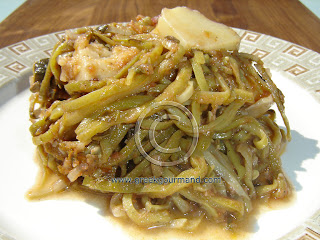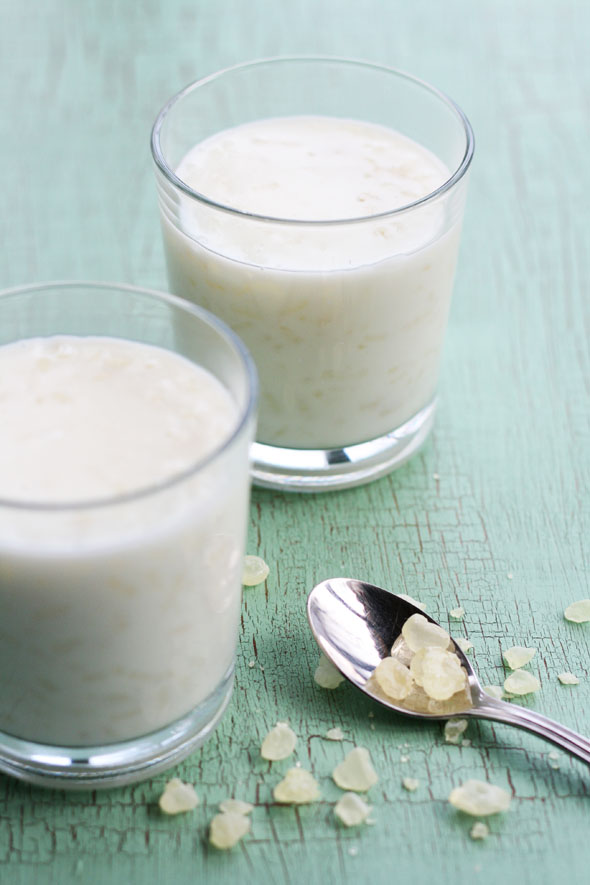Fassolakia Moraïtika – Peloponnesian Braised Green Beans (Φασολάκια Μοραΐτικα)

A rustic Greek vegetarian dish from the Peloponnesus
There was once a City Mouse who went to visit his cousin in the Country. The Country Mouse was a simple fellow but he loved his relative from the Big City and did his best to make him feel at home; all he could offer him were some beans and bread crumbs, and he generously spread these before him. The City Mouse snickered at the poor country food, and said: "Cousin, I cannot understand how you are satisfied with such simple food as this… Of course one really should not expect too much seeing as you live way out here in the Country, but why don’t you come back with me to the city for a while and let me show you how to really eat? A week in town with me and you will wonder how you could ever have been content with country living." And so, the two mice set off for the Big City and arrived at the City Mouse's residence late in the evening. "You look like you could use some refreshments after our trip," the City Mouse offered politely, and led his Country cousin into a large dining room where they found what remained of a rich banquet. Soon the two mice were feasting on tasty meats and puddings and all the trimmings of a fine table. Without warning, they heard some loud voices and then some vicious growling and barking. "What’s all that noise?" gasped the Country Mouse between bites. "Oh, that’s just the dogs of the house," answered the other. "Just the dogs of the house!?" cried the Country Mouse in a frantic tone, dropping the sauce-dripping dumpling he had been munching on. In that instant the dining room door burst open and in rushed a pair of large dogs, and the two mice jumped from the table and scurried madly for cover through a small crack in the wall. "Alright then, take care Cousin, and thank you for your grand hospitality here in the Big City" said the Country Mouse when he had regained his breath and some composure. "Are you leaving already?" asked the other in a surprised tone. "Yes," he replied; "Better beans and crumbs in peace and quiet than puddings and fine wines in fear and trembling." [Story adapted from Aesop’s Fables.]
With all that is going on in the realm of food production these days, it is likely in our best interest (collectively and individually) to revert to a simpler and less refined manner and substance of eating. Daily we hear about tainted mass-produced foodstuffs leading to illnesses and sometimes even deaths. Here in Canada China
Ingredients:
2 lbs. (1 kg.) fresh green beans, washed and trimmed
1 medium sized cooking onion, finely chopped
1 ½ cups (375 ml.) of fresh tomato juice, sauce, or strained tomato pulp
1 large or 2 medium sized red skin potatoes, washed and cut into eighths*
½ cup (125 ml.) of Greek extra virgin olive oil
4 tablespoons (60 ml.) of chopped fresh mint (if using dried mint 2 tbsp. will suffice)
Salt and pepper to taste
1 medium sized cooking onion, finely chopped
1 ½ cups (375 ml.) of fresh tomato juice, sauce, or strained tomato pulp
1 large or 2 medium sized red skin potatoes, washed and cut into eighths*
½ cup (125 ml.) of Greek extra virgin olive oil
4 tablespoons (60 ml.) of chopped fresh mint (if using dried mint 2 tbsp. will suffice)
Salt and pepper to taste
- Wash and clean the beans by trimming the ends and removing the strings. I use a bean slicer to remove the bean strings and to cut the beans lengthwise.
- Heat the olive oil in a cooking pot over a medium-high heat and when the oil is ready reduce the heat to medium and sauté the chopped onion until slightly softened and translucent.
- Add the beans to the pot and stir them well to mix with the olive oil and onion, then cover the pot and let it simmer for a few minutes. Then, uncover the pot and stir the contents again before adding the potato, tomato juice/sauce/pulp, the mint, and the salt and pepper along with 1 cup of water. Stir everything well, but make sure that the potato pieces end up under the beans in the pot. Bring the contents to a boil, reduce heat to medium-low, partially cover the pot (leaving it slightly open to allow steam to escape so the sauce may reduce) and let simmer for 45 minutes to an hour, or until the beans and potatoes are tender enough to be cut with a fork. Stir occasionally if necessary but avoid the temptation to add water to cover as this will result in a runny, thin sauce, and this dish is not meant to be soupy. IMPORTANT: stirring is not recommended in the latter stages of cooking as doing so will break up the potato chunks and this should be avoided.



Comments
Post a Comment